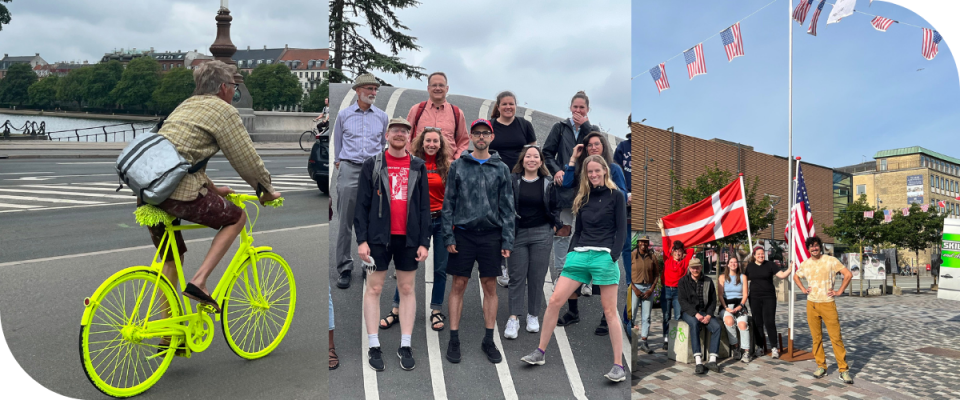Workshop: Introduction to APIs with PORTAL
Thursday, February 20, 2025, 1:00pm to 4:00pm PSTPortal is the official transportation data lake for the Portland, OR-Vancouver, WA Metropolitan Region. An API, which stands for "Application Programming Interface," is a set of rules and protocols that allows different software applications to communicate with each other.
What will this workshop teach?
We are offering a free three-hour introductory workshop about APIs that includes practical examples using PORTAL's API.
Who should attend?
People who are interested in APIs and how to use them.
What software is needed?
Participants who wish to follow along with the practical examples should download Visual Studio Code (VSC) and add the Thunder Client extension in VSC.
Instructor: Basem Elazzabi, Senior Research Associate, TREC at PSU
 Basem is the head of programming and development for the PORTAL and BikePed Portal projects at...
Basem is the head of programming and development for the PORTAL and BikePed Portal projects at...
PSU Transportation Seminar: Preventing Carbon Emissions With Imaging-Based Civil Infrastructure Assessment And Evaluation
Friday, February 21, 2025, 12:00pm to 1:00pm PSTFriday Transportation Seminars at Portland State University have been a tradition since 2000. We've opened up PSU Transportation Seminars to other days of the week, but the format is the same: Feel free to bring your lunch! If you can't join us in person, you can always watch online via Zoom.
THE TOPIC
For concrete bridges without existing plans, simplified and highly conservative load rating (structural evaluation) methods may be used, which can lead to unnecessary load restrictions, unjustifiable strengthening, or in the worst case, preventable replacements. Avoiding these outcomes not only saves money but it prevents carbon emissions from longer travel and construction activities and resources associated with replacement.
This presentation discusses a case study of a prestressed concrete bridge that required a load rating, and for which no plans existed. Imaging and image fusion using radar and ultrasonic measurements taken from the top and bottom of the slab were performed to produce a digital cross-section of the bridge. Using this image, the location of the reinforcing steel, as well as the location, size, and content of internal air voids could be determined. After extracting these variables and using them in an improved load rating, load restrictions were found to not be necessary...
Read moreWorkshop: How To Format Count Data For BikePed Portal
Thursday, February 27, 2025, 11:00am to 12:30pm PSTBikePed Portal is a comprehensive non-motorized data management system for manual and automated non-vehicular multi-modal counts housed at Portland State University (PSU). This specialized data lake and management system is designed to make sharing data—within an agency, with partners at other agencies, and with the public—easily accessible.
What will this workshop teach?
This 1.5 hour workshop will go over what metadata are required and how to format your data into an acceptable machine readable format to be ingested into BikePed Portal.
Who should attend?
Organizations and agencies interested in using BikePed Portal to host their manual count or short-term bicycle and pedestrian counts should attend this workshop.
Learn more about BikePed Portal: Making the most of non-motorized data.
Instructor: Tammy Lee, Transportation Data Program Administrator, TREC at PSU
 Tammy is working on a variety of projects for TREC, including documentation, data synthesis, analysis, and...
Tammy is working on a variety of projects for TREC, including documentation, data synthesis, analysis, and...
PSU Transportation Seminar: Active Transportation Data Fusion: Incorporating Big Data to Estimate Volumes
Friday, March 14, 2025, 12:00pm to 1:00pm PDTFriday Transportation Seminars at Portland State University have been a tradition since 2000. We've opened up PSU Transportation Seminars to other days of the week, but the format is the same: Feel free to bring your lunch! If you can't join us in person, you can always watch online via Zoom.
THE TOPIC
Planners and decision-makers have increasingly voiced a need for network-wide estimates of bicycling and walking. Such volume estimates have for decades informed motorized planning and analysis but have only recently become feasible for non-motorized travel modes. Recently, new sources of activity data have emerged derived primarily from GPS-based smartphone location data, both app-based and passively collected. The project team has led several research projects aimed at evaluating and integrating the emerging sources with conventional demand data, including observed bicycle and pedestrian counts, to assess the value added of various emerging sources and the potential for estimating network-wide volumes. This presentation will summarize lessons learned and propose next steps for agencies and researchers who want to incorporate big data into active transportation volume / exposure estimates.
KEY LEARNING OUTCOMES
- The contributions and cautions of using emerging big data sources...
Study Abroad: Sustainable Transportation in Denmark
Saturday, June 21, 2025, 5:00am PDT to Saturday, July 5, 2025, 5:00pm PDTPortland State University offers an introduction to sustainable transportation and land use applications in the context of Denmark through a two-week study abroad program in the summer 2025 term.
Learn more on the study abroad program page: Sustainable Transportation in Denmark.





